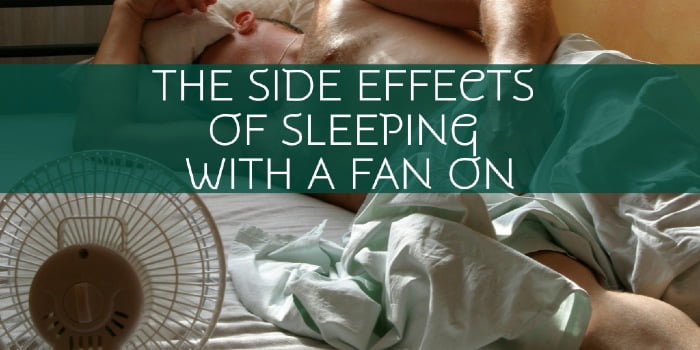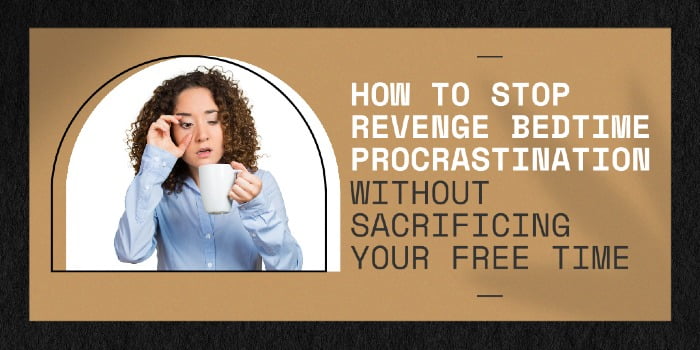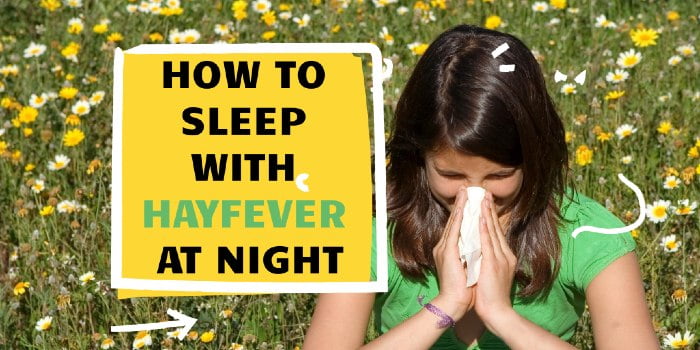Sleep is one of the most important things you can do for your health, wellbeing, and mood.
It’s how we rest, heal and recover our bodies and our minds for the next day. Yet, for a lot of us, sleep is something that is hard to come by. If you lay there at night tossing and turning, you might be suffering from poor sleep hygiene.
Don’t worry, we’re about to help you get a better night’s rest with these top 9 tips for good sleep hygiene.
What is sleep hygiene?
Sleep hygiene isn’t about how clean you are for bed. It’s more about setting yourself up to be in the best position to get rested at night.
Sleep hygiene is all about making healthier choices and routines that encourage better rest at night. It covers a large range of factors, including lifestyle changes and activities, food and drink and the environment that you’re in.
For example, if drinking a lot of alcohol means you don’t wake up feeling rested, a good sleep hygiene habit would be to give up or reduce the amount of alcohol that you drink, particularly at night time.
Sleep hygiene is building healthy habits that encourage better rest. These habits are different for everyone. That’s why we’ve put together the top 9 tips for good sleep hygiene below, so you can start testing and seeing what works for you.
Why is sleep hygiene important?
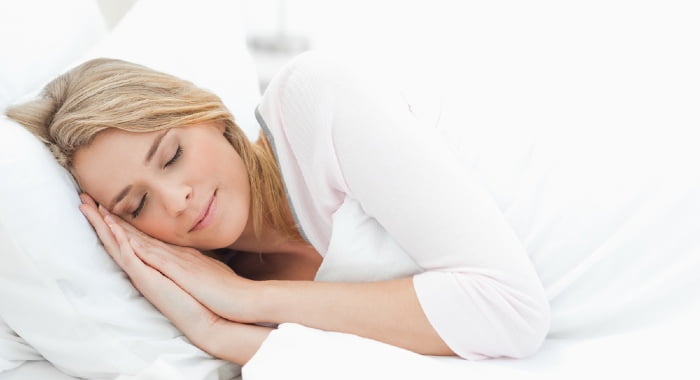
Sleep hygiene is important to improve the amount and quality of your rest at night. The better you sleep, the more healthy and happy you are.
Without your recommended hours of sleep a night, you risk some pretty serious health problems. In fact, one report showed that adults that sleep less than 7 hours each night are much more likely to have health problems, including heart attack, asthma, and depression.
Without the right amount of sleep, you may also experience:
- Feeling tired, unmotivated, and lethargic during the day;
- Moodiness, irritability, or rapid mood swings;
- Lack of concentration and difficulty making decisions;
- Memory issues;
- Frequent colds or coughs from a weakened immune system.
And more. You can find out more about this in our guide to why sleep is important here.
What are the benefits of good sleep hygiene?
The biggest benefit of good sleep hygiene is that you’ll improve your mood when you’re awake. The better you sleep, the better you’ll feel.
That means with good sleep hygiene, you’ll be:
- Motivated and energised during the day;
- Less anxious and more confident;
- Able to concentrate and think more creatively;
- Remember items and details more clearly;
- Happier and in a more stable mood;
- Feel stronger and less sustainable to common colds or coughs.
In addition, you’ll also be less at risk of health issues and problems such as diabetes, heart conditions and depression.
Top 9 tips for good sleep hygiene
Sleep hygiene is all about building better habits.
Research has demonstrated that forming good habits is a central part of health. The more you perform a habit, the more they begin to feel automatic. So, the longer you practice sleep hygiene, the easier it will be.
It can be hard knowing where to get started. So, to help you out, start by trying out these top 9 tips for good sleep hygiene.
1. Set a sleep schedule
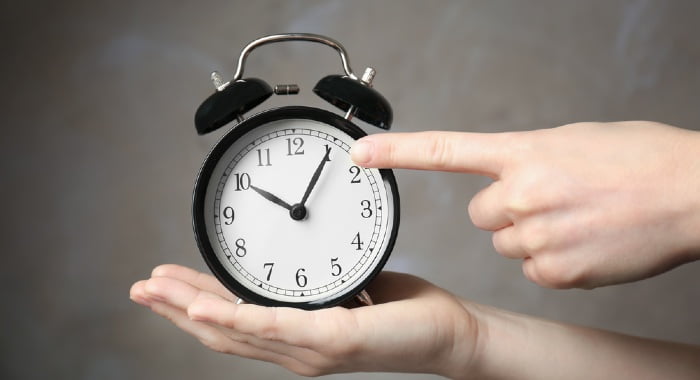
A sleep schedule is about going to bed and waking up at the same time every day.
Just as bedtime is used to get children into a routine, it can be used to help regulate your sleeping and get your body used to becoming tired and waking up at the right times.
To start, choose yourself a bedtime when you normally feel tired. If you normally go to bed around 11 pm, you don’t want an 8 pm bedtime as you’ll just lay there for hours. Then, set an alarm every single day to get yourself out of bed at the same time each morning – even on weekends.
It may feel horrible giving up those weekend layins at first, but over time you’ll begin to naturally wake up at that time and feel more refreshed and awake.
If you do want to change the time you go to sleep, make gradual changes. So, set your first bedtime at 11 pm. Then after a week, move it to 10 pm. And so on, until you’re at the right time for you.
2. Limit nap time
The second of our tips for good sleep hygiene is about naps. Naps are a good way to make up for lost sleep. But if you’re trying to create a good sleep hygiene routine, they may not always be the best option.
While you’re setting your new routine, try to limit naps to 15 to 20 minutes in the daytime. If you usually take a nap in the evening or feel tired after dinner, try to do a stimulating task instead to keep yourself awake until bedtime.
3. Control your exposure to light
Light plays an incredibly important role in sleep.
Sleep is controlled by two main systems: the circadian rhythm and the sleep drive. The sleep drive is your body’s measure of how tired you are and how long you’ve been awake.
The circadian rhythm, also called the biological clock, is what tells your body to fall asleep at night and wake up in the day. To work, your circadian rhythm needs light. Light tells your body that it’s time to wake up, and darkness tells your body that it’s time to go to sleep at night and start producing melatonin.
One of the best tips for good sleep hygiene is to be careful with the amount of light that you see and when.
- In the morning, you’ll want to expose yourself to bright sunlight to feel more awake. If you can, try watching the sunrise.
- In the daytime, continue viewing as much natural light as possible. If you work inside, try taking a walk outside during lunch, opening your blinds, or moving your work station closer to the window to increase your light.
- At night, you’ll want to limit the amount of light you see. So, avoid bright screens from your phone, TV, or computer 1-2 hours before bedtime. If you can, try to dim the lights in your home or use lamps the closer it is to bedtime.
If you need to get up during the night, don’t switch your lights back on. Try to keep your house as dark as possible, only using small, dim lights to make your way around.
4. Exercise during the day

Regular exercise can even improve the sleep you get at night. In fact, one study found that exercise halved the time it took to fall asleep and gave participants 41 more minutes of sleep at night.
The more vigorously you exercise, the more powerful the benefits. But you don’t need to go into warrior mode to unlock these benefits. Even a light 10-minute walk during the day can improve sleep quality.
But make sure that you plan your exercises for the daytime. Exercise also releases hormones like epinephrine and adrenaline which help awake and alert, so you don’t want to be releasing these too close to bedtime.
5. Avoid certain foods and drinks
Certain foods and drinks can have a big impact on the quality of your rest, hence making this one of the most important tips for good sleep hygiene.
For example, caffeine makes you feel more awake and alert by blocking a chemical called adenosine. Adenosine is responsible for making you feel tired, so if you have caffeine in the evening, your body won’t start producing the melatonin you need for sleep because it doesn’t feel tired. That means more late nights for you.
Alcohol can also interfere with your sleep by also blocking how much melatonin you produce. Even if you might get to doze off quickly when drunk, it will limit the amount of sleep you get and the quality of it.
So, for better sleep, you want to cut out foods and drinks with caffeine and alcohol, particularly in the evening.
In addition, eating lots of sugar and refined carbs such as white bread, white rice, and pasta during the day can trigger wakefulness at night and pull you out of the deep, restorative stages of sleep.
6. Make your room clean and distraction-free
Another one of the great tips for good sleep hygiene is making your room a haven for snoozing. To do this, get rid of any mess and distractions, keeping the room clean and tidy. Your room and bed should be used for sleeping and sex, and nothing else.
That means every time you go to bed, your brain will associate it with sleep.
If you often watch TV in bed, you might want to consider removing the TV so you don’t tempt yourself into bad habits that will keep you awake.
For optimum sleep, you will also want to keep your room quiet and cool. Most people drift off best in temperatures around 18° C. A bedroom that is too hot or too cold can interfere with the quality of rest you get.
7. Make sure you have a great mattress
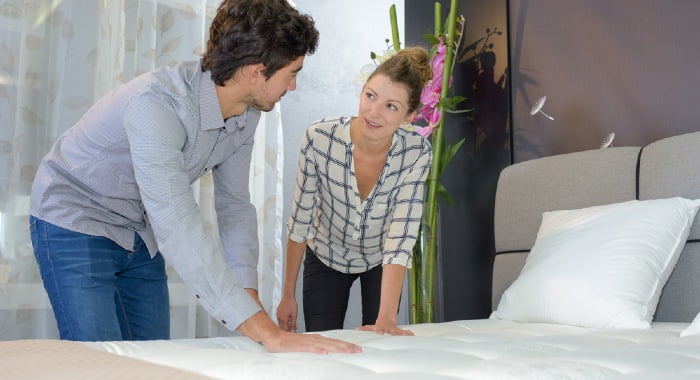
Your bed should be comfortable.
If you’re spending 8 hours of your day sleeping inside your bed, you need to make sure that you’re using the right mattress and pillows to keep you comfortable and supported throughout the night.
Uncomfortable beds will make you feel sore in the morning and can disturb the quality of your sleep. Not sure if you have the right mattress? Read our guide to how often you should get a new mattress and see if you need to upgrade.
8. Wind down before bed
If you often find yourself awake at night worrying or planning your next day, this tip is one you need to pay attention to.
Before going to bed, you want to create a routine of winding down your body and your mind. There are multiple ways you can do this, including reading a few chapters of a book, taking a warm bath or trying out one of our relaxation exercises for sleep.
9. Get up if you can’t sleep
Finally the last of our top tips for good sleep hygiene. Although this may seem counter-intuitive if you can’t sleep, get out of bed. There’s nothing worse than laying there tossing and turning all night – all this does it put more pressure and stress on yourself to drift off.
If you wake up or are laying in bed for more than 20 minutes with no success, get up. Try to avoid clocks and do a low-energy task instead, such as reading a book or fetching a glass of water. Make sure you keep the lights dim and stay away from electronic devices, as this will make it more difficult to get back to sleep.
When you feel tired enough, go back to bed, and try again. But try not to put too much pressure on yourself.
Your first step towards better sleep
The first step to forming better sleep hygiene habits is to give it a try. Using the top tips for good sleep hygiene, you’ll have plenty of resources and places to start your journey.
Just make sure you give any tip you try time to see the effects. Nothing happens overnight, so keep at it to see how much it improves your sleep. It may also be worth keeping a diary to track your progress.
If you’re still struggling, book an appointment with your GP to see if there are any underlying sleep disorders that may also be impacting your ability to get a good night’s rest.



